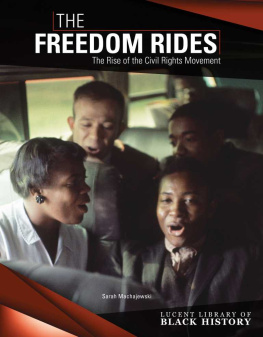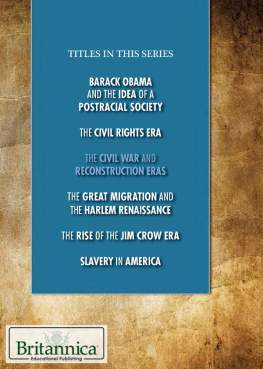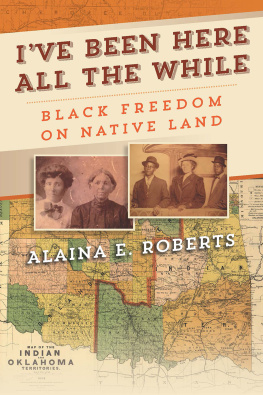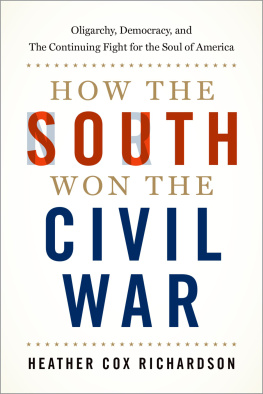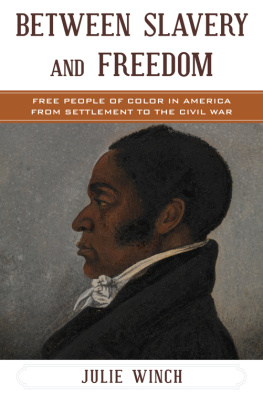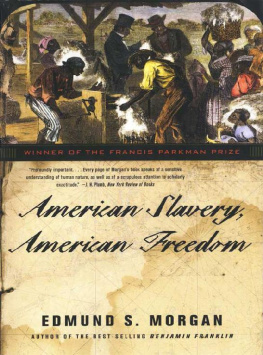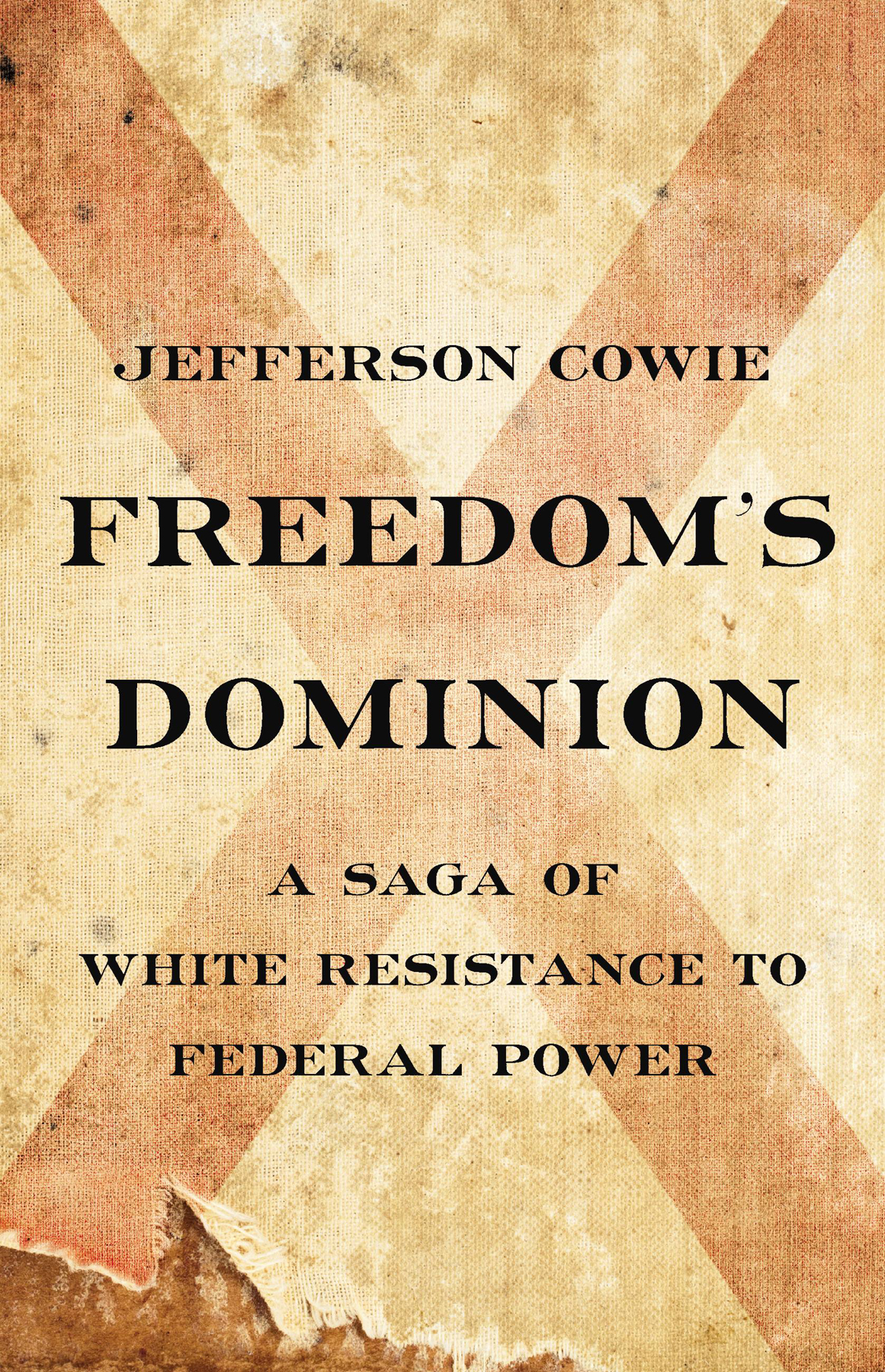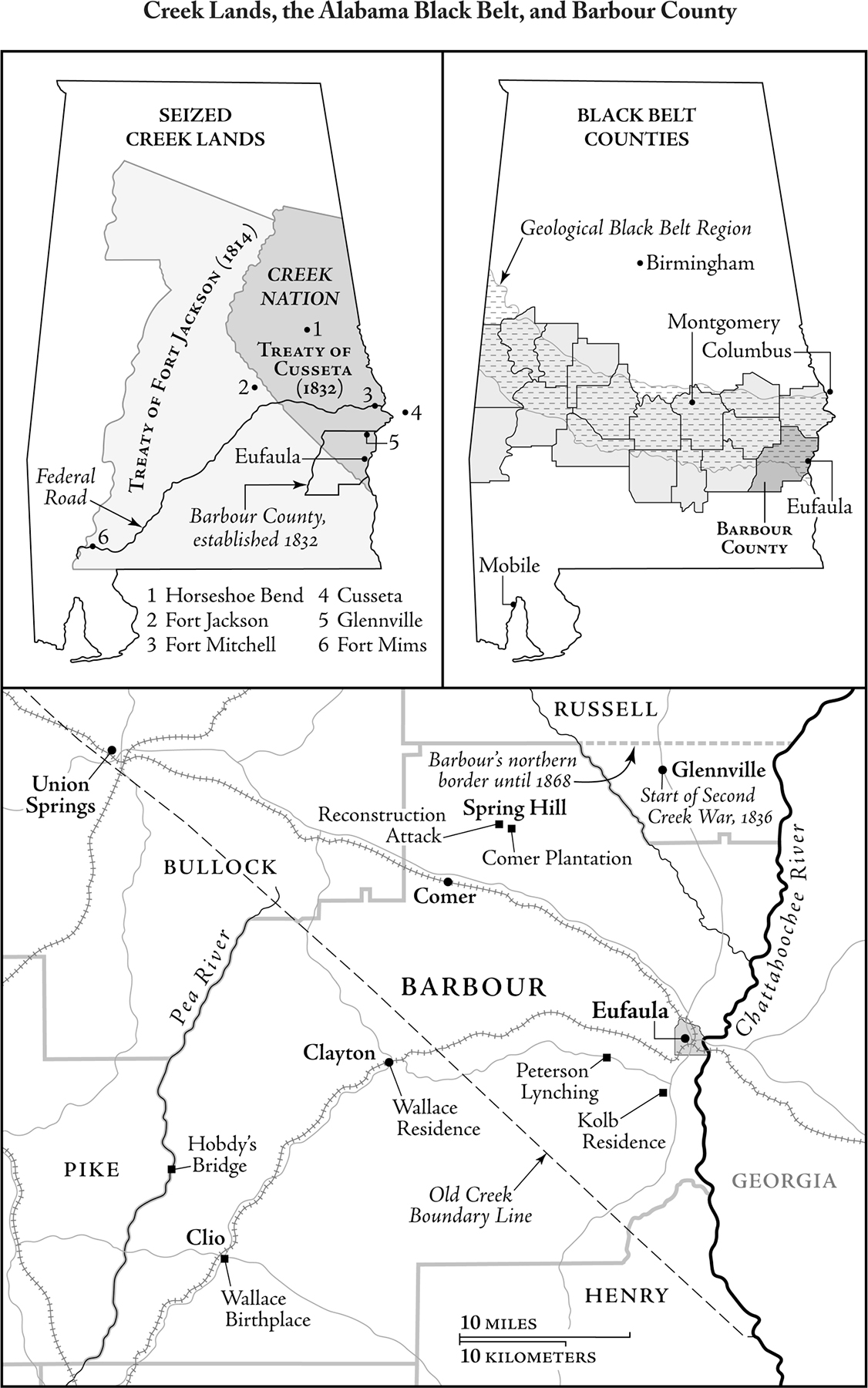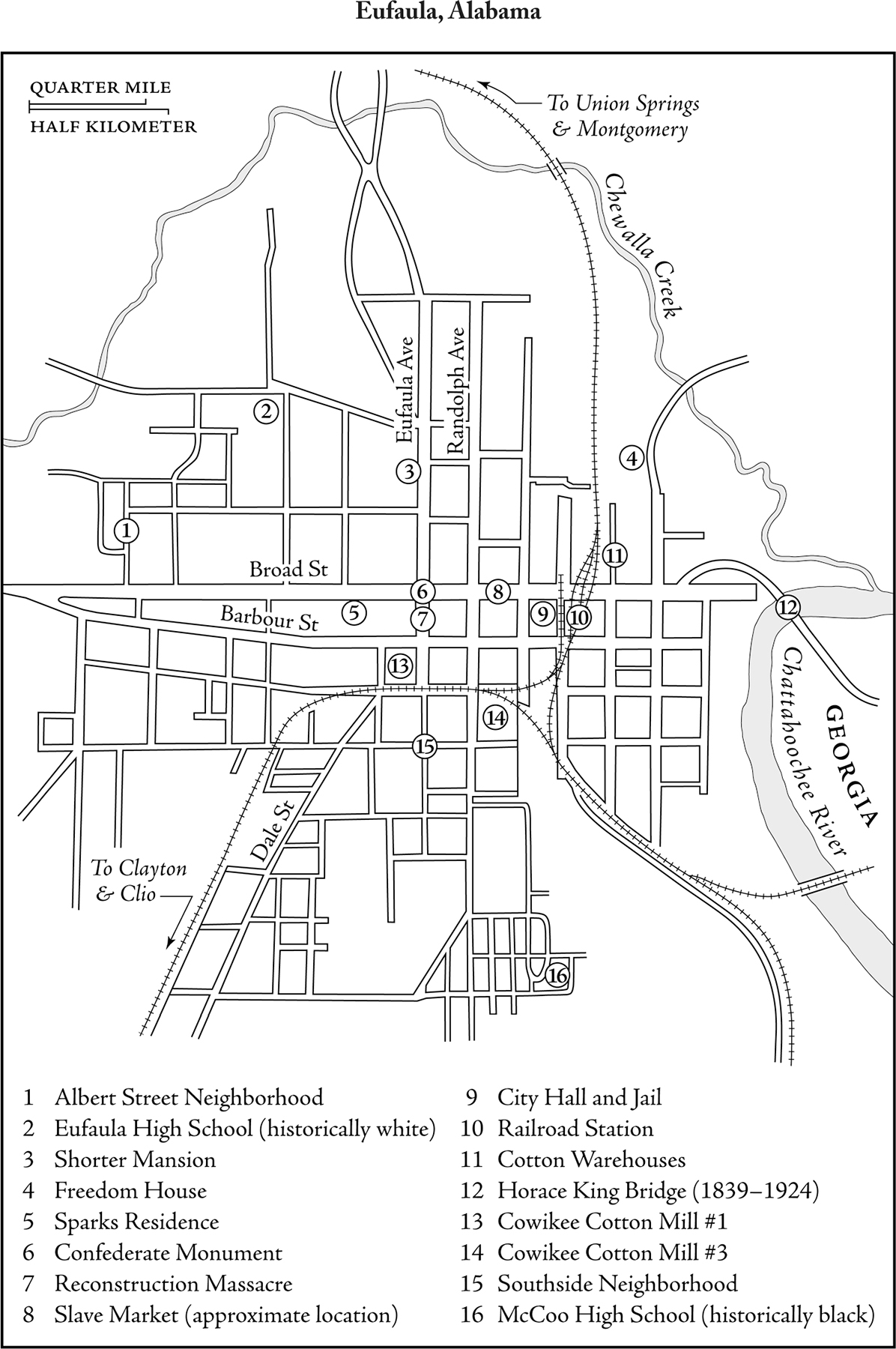praise for
freedoms dominion
Jefferson Cowie has a knack for publishing instant classics: books that change historians conversations. This is his most extraordinary yet. With eloquence and with brilliance, he delves deep into the annals of a specific place, Barbour County, Alabama, in order to excavate the foundations of Americas darkest and most enduring story: how freedom became a national alibi for cruelty, inequity, and reaction. As soon as I finished reading it, I wanted to start over and absorb it all over again.
Rick Perlstein, author of Reaganland
Cowie has given us a deep history of the long war on the federal governmentespecially when it came to policies advancing class and race equality, of the evolution of white grievance politics, and of a new way of thinking about the psychic structure of American Exceptionalism. With eloquent, precise prose, Cowie clears away the cobwebs to reveal a national malady long in the making.
Greg Grandin, Pulitzer Prizewinning author of The End of the Myth
A fascinating book, Freedoms Dominion takes us to the states-rights stronghold of Barbour County, Alabama. Barbour was the birthplace of Governor George Wallace, whose infamous defense of segregation described integration as tyranny, segregation as freedom, and equal access to the ballot as a threat to individual rights. Wallaces views illustrate the confounding interdependence of ideas about freedom and oppression in American politicsas does Barbour Countys long history of state-building rooted in antiblack violence, white supremacist rule, and Indian land dispossession. Freedoms Dominion offers a searing account of that history that leaves one wondering whether American freedom can ever be disentangled from the causes it has supported.
Mia Bay, author of Traveling Black
Freedoms Dominion covers centuries of American history in Eufala, Alabama, from the violence of settler colonialism through the ascent of arch-segregationist George Wallace, the regions most famous native son. Cowie is interested in how people in poweralmost always white menused claims of freedom to dominate and enslave others, and how they articulated domination as resistance to a tyrannical federal government. This history has urgent implications for how we understand white supremacist and anti-government politics today.
Kathleen Belew, author of Bring the War Home
Cowies Freedoms Dominion is a magisterial narrative history of white grievance politics. Cowie reveals the origins of these often hypocritical and confounding perspectives in which those who stole, enslaved, and segregated would themselves claim to be victims of federal overreach even as they oppressed so many others. Cowies terrific book explains the Southern roots of that racialized ideology and reveals how one of the most influential segregationist rhetoricians of the 1960 s helped repackage this powerful form of regional white-identity politics for the rest of the nation.
William Sturkey, author of Hattiesburg
Gripping and haunting. Cowies meticulous accumulation of detail and candid assessments make for distressing yet essential reading. This is history at its most vital.
Publishers Weekly (starred review)
The Great Exception:
The New Deal and the Limits of American Politics
Stayin Alive:
The 1970s and the Last Days of the Working Class
Beyond the Ruins:
The Meanings of Deindustrialization (co-edited)
Capital Moves:
RCAs Seventy-Year Quest for Cheap Labor
Copyright 2022 by Jefferson Cowie
Cover image: Alabama State Flag Sailorr / Shutterstock.com
Cover copyright 2022 by Hachette Book Group, Inc.
Hachette Book Group supports the right to free expression and the value of copyright. The purpose of copyright is to encourage writers and artists to produce the creative works that enrich our culture.
The scanning, uploading, and distribution of this book without permission is a theft of the authors intellectual property. If you would like permission to use material from the book (other than for review purposes), please contact permissions@hbgusa.com. Thank you for your support of the authors rights.
Basic Books
Hachette Book Group
1290 Avenue of the Americas, New York, NY 10104
www.basicbooks.com
First Edition: November 2022
Published by Basic Books, an imprint of Perseus Books, LLC, a subsidiary of Hachette Book Group, Inc. The Basic Books name and logo is a trademark of the Hachette Book Group.
The Hachette Speakers Bureau provides a wide range of authors for speaking events. To find out more, go to www.hachettespeakersbureau.com or call () - 6591 .
The publisher is not responsible for websites (or their content) that are not owned by the publisher.
Library of Congress Control Number: 2022940794
ISBNs: 9781541672802 (hardcover), 9781541672819 (ebook)
E3-20221027-JV-NF-ORI
to those who have kept faith in a better freedom
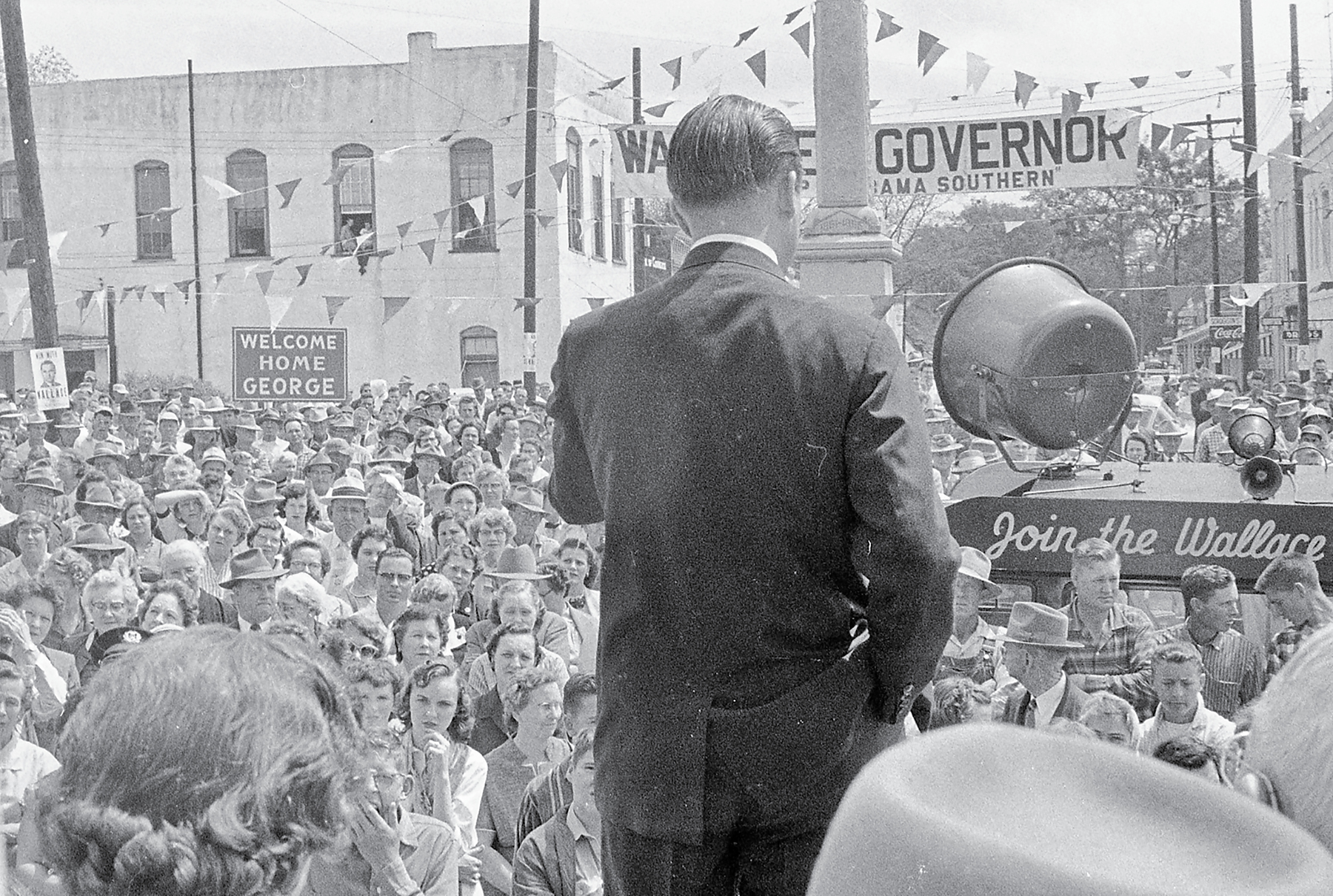
George Wallace campaigns before his hometown crowd in 1958 . Wallace amplified a message of freedom as white resistance to federal power that defined the politics of his native Barbour Countyand much of the nationsince the 1830 s.
The great force of history comes from the fact that we carry it within us, are unconsciously controlled by it in many ways, and history is literally present in all that we do. It could scarcely be otherwise, since it is to history that we owe our frames of reference, our identities, and our aspirations. And it is with great pain and terror that one begins to realize this.
james baldwin, 1965
G eorge wallace, ever proud and defiant, tightened his fighters frame as he assumed the spot where Jefferson Davis was sworn in as president of the Confederacy over a century earlier. Chin forward, chest puffed out, the new governor stood high on the rostrum, flanked by undulating waves of red, white, and blue bunting. A Confederate flag adorned the podium before him. When he began to speak, Wallaces lips curled around his famous cocksure Southern drawl, his vowels gliding and stretching toward some secret past. The new governor seemed to transcend timea man as much from the nineteenth century as from the Space Age. January , 1963 , was the coldest day in almost any Alabamians lifetime, and the fog of the governors breath rose into the winter air. The man who would go on to become the firebrand of the modern conservative movement seemed to breathe history and exhale ghosts.
The new governor began his infamous inaugural with an homage to the specifics of place. Thanking the home folks of his native Barbour County for giving an anxious country boy a chance, he called out no fewer than twenty-five locations in that county on the banks of the Chattahoochee RiverHaiglers Mill, Spring Hill, Baxters Station, Horns Crossroads, Baker Hill, Eufaula, and his own birthplace, Clio (pronounced here with a long i , as in Ohio). Like his audience, Wallace understood history in terms of place as well as time: settings of rich soil, old churches, familiar streets, sharecropper shacks, opulent mansions, and buried ancestors. Such places of enduring independence and eternal innocence, Wallace would argue, needed to be defended from the ominous storm of federal forces forever gathering just over the horizon.


